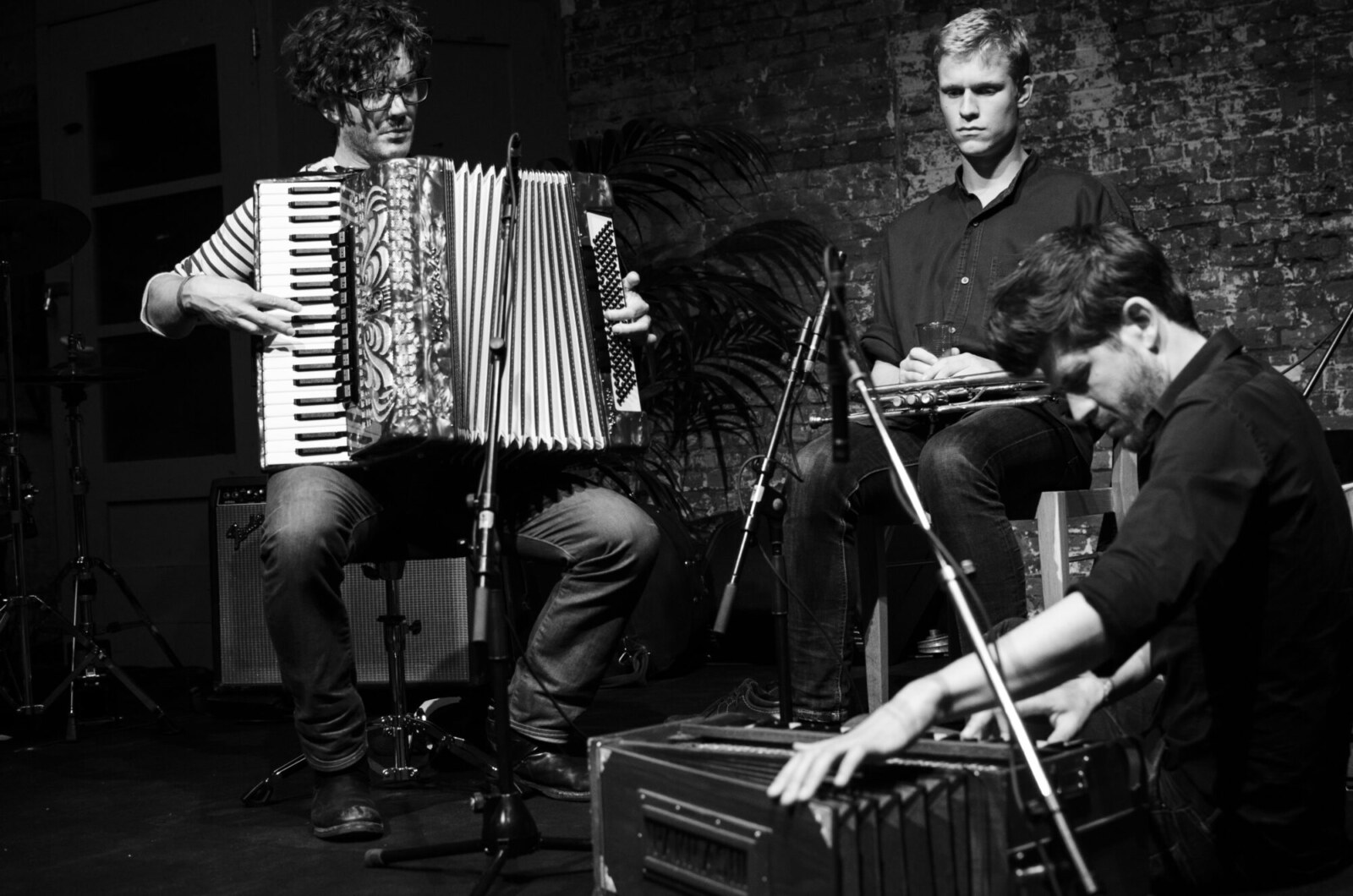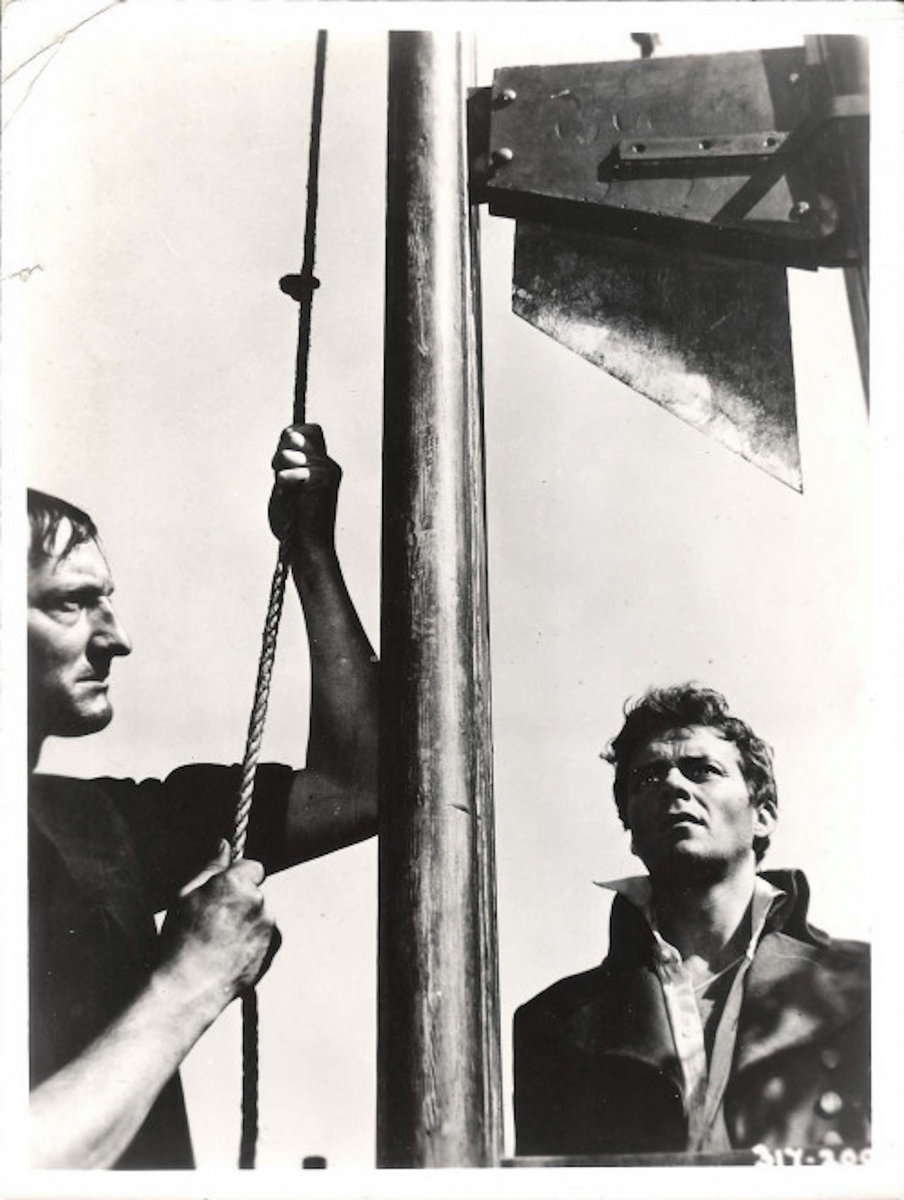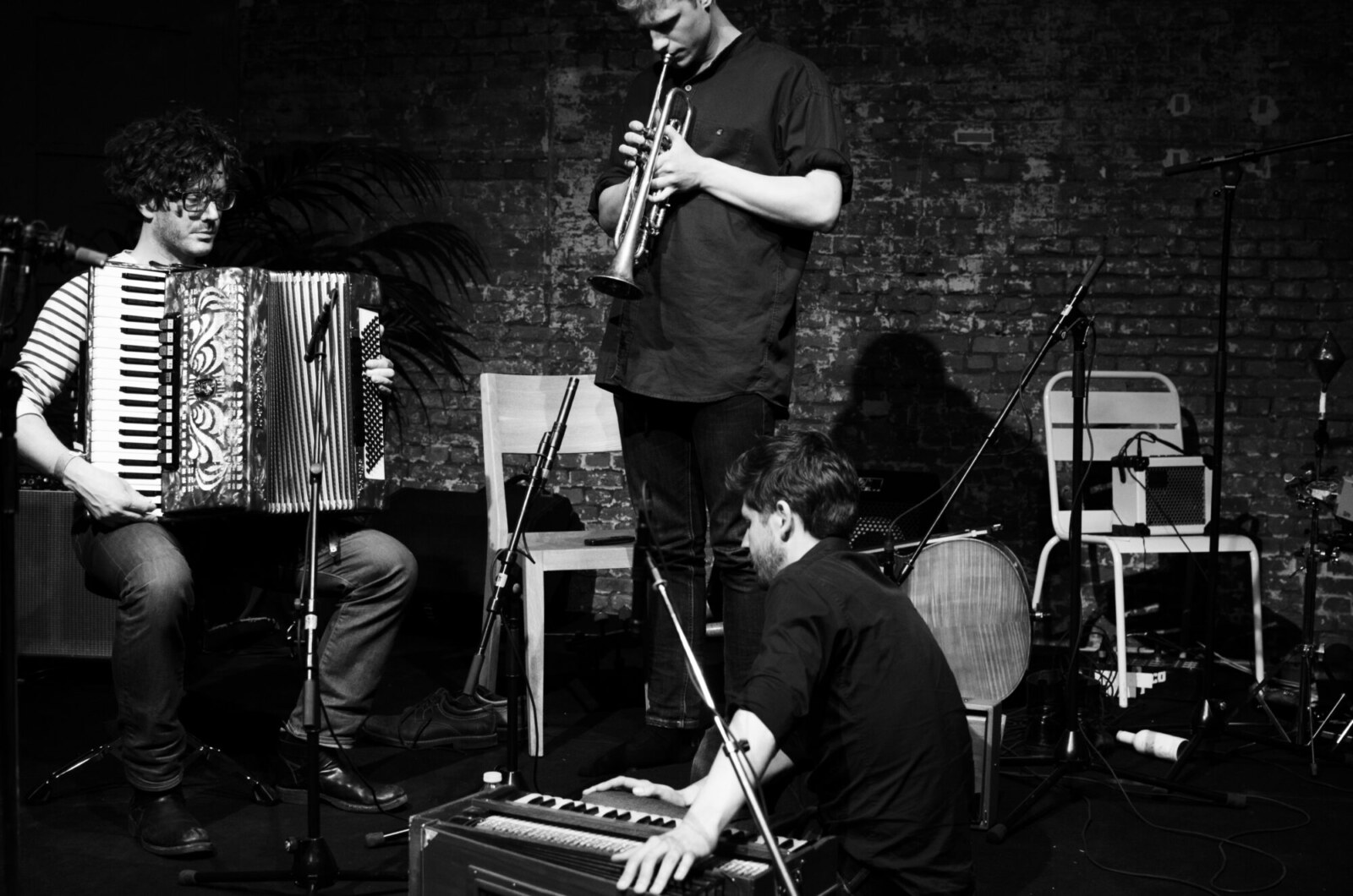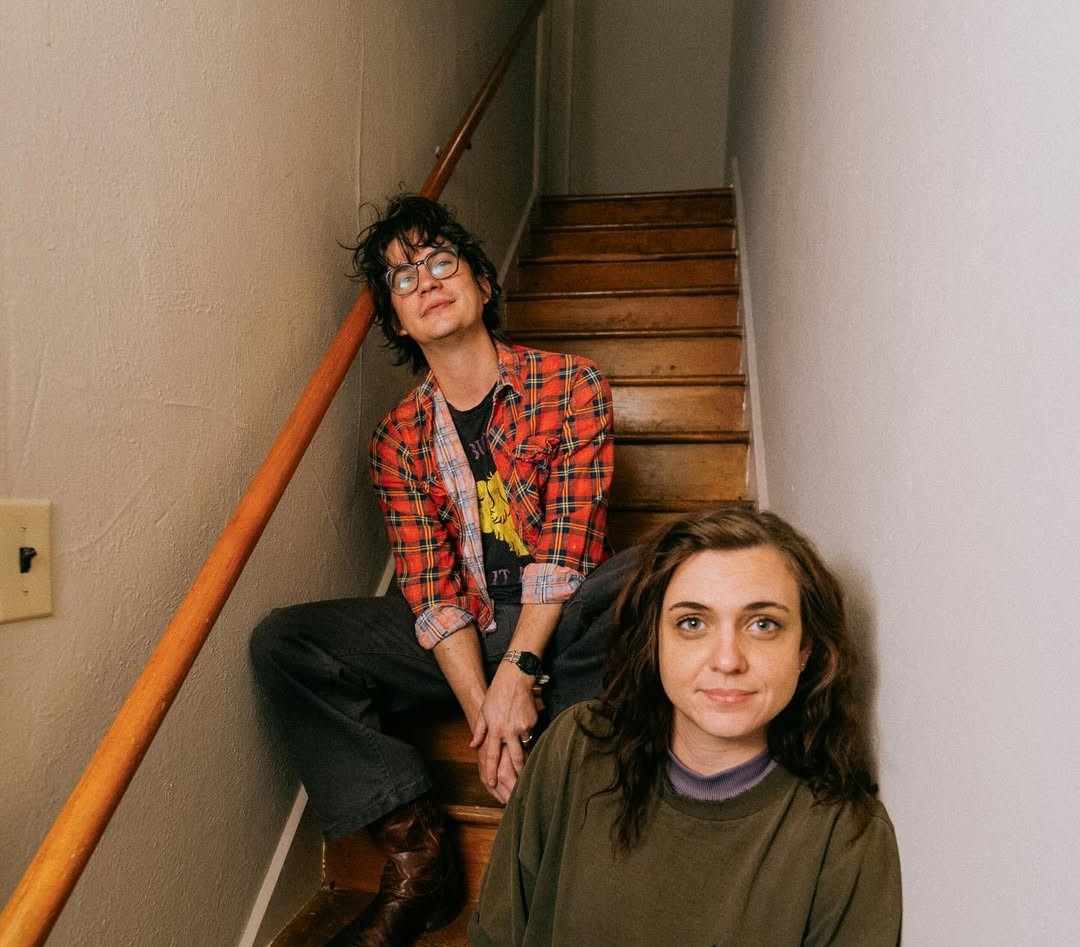Bow Ether Group
‘Cyclones Of Magnetic Man’ is a Sustained Tone C60 tape by Bow Ether Group, the duo of Brecht Ameel (Razen, Het Interstedelijk Haroniumverbond) and Glen Steenkiste (Hellvete, Het Interstedelijk Harmoniumverbond, Silvester Anfang).
“An escape from the Now while simultaneously heightening the Now”
How did the two of you get to know each other?
Glen Steenkiste: I think we got to know each other around the time Kraak released the Razen / Sheldon Siegel split LP, back in 2010. It was Steve, who was co-running Kraak at that time, who said to me: “You should ask Brecht to play music together. I think you will get along well with him.” So I did, and indeed, it seemed like we got along well together.
Brecht Ameel: Yes, credit goes to Steve, who was our musical matchmaker!

What do the two of you have in common? And what are the differences between the both of you?
Glen: I think we both have the same interest in timbre and we share a love for acoustic sounds and the effect a room or an environment can have on it. And we both like long form music and music you really have to listen to. The difference between us is that Brecht is a very well-trained musician and I am completely self-taught and not very trained. In the beginning it made me a bit nervous, but along the way I discovered there was no need for that. I really learned a lot from Brecht by playing together.
Brecht: I agree on all of the commonalities Glen mentions above. And I’m a bit sorry to hear about the nerves, haha! The way I see it, a musician like Glen is maybe not schooled in a classical sense, but he is a trained musician nonetheless; trained by many years of careful listening, and trained by carving out his own road, and following this road down to its most extreme conclusion – much in the same vein as certain electronic producers, who sometimes become super-specialists, not because of schooling, but because of a certain involvement and work ethic. For me, there was a lot to pick up from that approach as well.
How did Simon Marius get involved?
Glen: Simon got involved because Koen Vandenhoudt from Sound In Motion asked Brecht and me to do something together with Simon for the Oorstof festival in 2015. The idea of the festival was that there would be all kinds of collaborations. Bart Sloow played with Ignatz, Gerard Herman and Gino Coomans teamed up with Kris Vanderstraeten … At that time Brecht and I had already been playing together for a while in the Bow Ether Group set up, but at the same time I was also making music together with Simon. Simon on an old Elka analog synth and me on harmonium. So it was easy to expand the Bow Ether Group into the Bow Aether Group, as we called the trio for that show. You can watch the full show on YouTube.
Brecht, why do you play the accordion on this record?
Brecht: I chose the accordion because it seemed like the ideal instrument to add to Glen’s harmonium. And I had a beautiful accordion lying around, one that had a crazy story attached to it – of my grandfather trading it for a coat on the Bulgarian black market a very long time ago.
“Very specific atmosphere and moment in time”
Why are there 5 years between the recording and the release of this record?
Glen: The original plan was to release the recordings on an American tape label, but like a lot of plans in life it never materialized. And after that we just forgot about it for a while. Family life took over. But I always kept the idea of releasing those recordings in the back of my mind. A couple of years later I passed the recordings to Ulf Schütte from Hangover Central Station, who also released a Hellvete tape some years back, and he and Rasmus, the other half of Hangover Central Station, liked the recordings and were willing to release them on tape. So all of a sudden we were 5 years later. And in the meantime Brecht was also a member of Het Interstedelijk Harmoniumverbond, so for me it doesn’t really feel like a 5 year old thing. It’s not like we haven’t made music together since then.
Brecht: I always felt particularly strong about these tunes and the way the combination of harmonium and accordion bleeds into something quite electronic- and eerie-sounding. For myself, these two half-hour pieces are attached to a very specific atmosphere and moment in time, a jumble of images and sounds that includes Glen’s house, the music we listened to and discussed during these recordings (Richard Lainhart’s ‘White Night’, to name one that immediately pops up in my memory), driving at night from St.-Denijs (where Glen lives) to Brussels (where I live). And it’s interesting to notice how some elements of Bow Ether Group leaked into Het Interstedelijk Harmoniumverbond. Precisely this is the strength of Het Interstedelijk – it’s an expansion of Glen’s solo work and solo ideas, but because Glen had been creating various sorts of music with all of the three band members separately, it also became a common ground for a variety of approaches, and for a variety of experiences in playing together.

Does every tape have a different lay-out, or am I wrong here?
Glen: I’m afraid you are wrong. Or you know something I don’t?
Discogs mentions as “style”: experimental/drone/minimal. Well done Discogs?
Glen: You can file our music there, I think. Although those tags cover so much different music that they became a bit meaningless. Maybe they should file us under: acoustic/listening/long tones?
Brecht: I have a strong aversion to the word “drone”. It’s an ugly word, evoking images of the military, or of surveillance.
Acoustic / Sustained Tone / Immersive Music, Sound Art…, I would be a little bit happier seeing that kind of terminology. But this is the kind of thing you can’t control anyhow. People will use tags and labels and “file under”… Once the music is out there, you have to leave it and let go.
I was wondering: did you play and record two half an hour sessions or did you edit the tunes in order to fit a C60 tape (2 times 30 minutes)?
Brecht: I think we edited it somehow, but I also recall that the playing time of two half hours imposed itself on us quite naturally. I still think it’s an interesting and under-appreciated length of time for a single track. What’s your thought on it, Glen?
Glen: I think Brecht edited the A-side first and I did the B-side a while after. I brought the edit to the 30 min mark to match the A-side. Haha… But I also think that 30 minutes is a good length for tracks like these. It’s a bit longer than the length of an LP-side and because of that you can use a different construction of the track and have a different focus. And it also forces the listener a bit more to dive into it really deep. But half an hour is still a bearable duration and therefore still inviting for the listener. And a tape is good medium for this, because you don’t have to cut a track into pieces or trim it down to 20 min to fit an LP-side. I don’t really like it when tracks get cut up in the middle because they are too long. Just use a medium like a tape or cd that fits the music. This is one of the reasons why I stopped being a “vinyl purist”.
Because this is for ‘Psychedelic Baby’: do you see this as psychedelic music? And what would your definition of “psychedelic” be?
Brecht: In the sense that it takes you to another place, or that it might suddenly shed a totally different light on your immediate surroundings, this music is certainly deeply psychedelic.
Glen: I think the overtones add a layer to our music that the listeners can fill in for themselves when listening. And because of that everybody hears the music differently. Even the same person can hear different things every time they listen. So in that way, what you hear is not 100% what is actually there and that’s pretty psychedelic to me, so yes, I see it as psychedelic music.
To me, as a listener, this music feels like a warm bath: you step into it and than you just let go. How is it to play this music?
Brecht: It’s a warm bath, but not without some bittersweet friction, or not without (maybe) establishing a close-to-paranoid sense of awareness.
Glen: It’s a balancing act between being super focused and being totally into the moment. And like Brecht says, that can give friction, but it feels great when you can overcome that friction. When that happens, “magic” happens. But it never feels like a warm bath. I don’t like a warm bath, I’m more the shower-type, an endless stream of hot water drops falling on your body. Never exactly the same, but always flowing and soothing.

Joel Vandrogenbroeck said music is a form of escapism from real life. Is that true? Or is it just the other way around: is making music an ultra-concentrated form of being in the now?
Brecht: Ideally, performing music and listening to music should be both. An escape from the Now while simultaneously heightening the Now; these two elements merging and feeding off into one another; giving you a more complex understanding of the passage of time and our place in it. A fun thing to note is that “escape from reality” or at least the urge to do so, has become a basal definition of the human condition.
Glen: I think a lot of people use “being in the now” to escape real life. They do mindfulness so they can clear their head and think of nothing. Playing music can work that way, but not always. Sometimes you do think of other things or you focus so hard on what you are doing that you’re completely going past “experiencing the now”. I play music so I can deal with real life, not to escape it, because a part of my real life is playing music.
Joeri Bruyninckx
Bow Ether Group Official Website
Hangover Central Station Facebook / Instagram / Bandcamp



